- Home
- Harlan Ellison
Partners in Wonder
Partners in Wonder Read online
Partners In Wonder
Harlan Ellison
CONTENTS
Harlan Ellison
INTRODUCTION: SONS OF JANUS
Robert Sheckley and Harlan Ellison
I SEE A MAN SITTING ON A CHAIR, AND THE CHAIR IS BITING HIS LEG
Ben Bova and Harlan Ellison
BRILLO
Robert Bloch and Harlan Ellison
A TOY FOR JULIETTE THE PROWLER IN THE CITY AT THE EDGE OF THE WORLD
Harlan Ellison
SCHERZO FOR SCHIZOIDS: NOTES ON A COLLABORATION
Avram Davidson and Harlan Ellison
UP CHRISTOPHER TO MADNESS
Theodore Sturgeon and Harlan Ellison
RUNESMITH
Joe L. Hensley and Harlan Ellison
RODNEY PARISH FOR HIRE
William Rotsler and Harlan Ellison
THE KONG PAPERS
A. E. Van Vogt and Harlan Ellison
THE HUMAN OPERATORS
Henry Slesar and Harlan Ellison
SURVIVOR #1
Samuel R. Delany and Harlan Ellison
THE POWER OF THE NAIL
Algis Budrys and Harlan Ellison
WONDERBIRD
Robert Silverberg and Harlan Ellison
THE SONG THE ZOMBIE SANG
Keith Laumer and Harlan Ellison
STREET SCENE
Roger Zelazny and Harlan Ellison
COME TO ME NOT IN WINTER’S WHITE
this book is dedicated—
with a little help from
our friends—to
JUDY-LYNN DEL REY
for kindnesses remembered
INTRODUCTION
SONS OF JANUS
These are stories I have written with other writers. Collaborations, they’re called. They are the products of two minds working together, sometimes in complete harmony, more often in opposition. The former, because the ideas were so right they needed no conflict to produce a coherent whole; the latter, because writers are perverse creatures who enjoy tormenting one another. And also, conscious opposition on the part of one of the collaborators, to the direction a story is taking naturally, may produce a stress that bends it unexpectedly in a totally unpredictable way. And from that can come a toad prince or a toad, depending on whether or not both writers know how to handle a fable run amuck.
The beloved Lester Del Rey—one of my early mentors in the craft of professional lying—told me once: never write a story with someone, that you can do as well by yourself. Well, I believe that. I tried writing a novel with Avram Davidson once, titled “Don’t Speak of Rope.” Ech. One of the most horrible experiences in a universe filled with death camps, hardhats, campus massacres and the human gamut that runs from Spiro to Manson; somewhere in a file drawer languish ten thousand words of that novel, unended, unlamented, unfortunate. So I do, I really do, agree with Lester.
Even so, life can occasionally become dull and predictable, and so, to spice it slightly, those of us with a flair for danger and high adventure take guided tours through the heart of Mt. Vesuvius, stalk the blood-sucking vampire bat through the swamps and fens of Bosnia and/or Herzegovina, join peace rallies, date beautiful models and, when all else fails, collaborate on fictions with other writers. I grant you the picture of world-weariness and jaded appetite I paint, the desperation of ennui that drives men to such hideous extremes as collaboration, is an ugly one. But I feel you must know what horrors and pitfalls lie behind this seemingly uncomplicated act. Ask Avram. Ech.
But the reward of successful collaboration is a thing that cannot be produced by either of the parties working alone. It is akin to the benefits of sex with a partner, as opposed to masturbation. The latter is fun, but you show me anyone who has gotten a baby from playing with him- or herself, and I’ll show you an ugly baby, with just a whole bunch of knuckles.
And so, risking the hisses and catcalls of overly critical readers and critics who will call these joint efforts (if you’ll pardon my carrying on the allusion from the preceding paragraph) merely gimmicky constructs, over the past many years I have yoked myself to fourteen other writers, and from these literary miscegenations have come the fictions before you.
My relationships with all of these men have been substantially more than what might be termed mere acquaintanceship. All of them are my friends, but not all of them like me. Nor do I like all of them. Many of them have done me favors I would be hard-pressed to repay in full or in kind. Others have messed me over hideously. From time to time I have been in serious disagreement with one or another of them. Between one of them and myself there was a shadow for many years. Between myself and another is something very much like the love of one brother for another. One saved my life, literally. I thought another had ruined it. One made me terribly proud of him, and then sold out, thereby destroying all my illusions about him. Two of them managed to alter the course and texture of my life. From one I learned much about the nature of love, from another the nature of hate. With one I dreamed odd dreams, and with another I learned people can only act as people, not as gods. One demonstrated there can be nobility even in failure, and another showed me how badly success can be handled.
Millions of words of conversation in the past nineteen years have passed between me and these fourteen men. Advice, shoptalk, problems, respect and denunciation. That is the nature of friendship.
But without these men, I would never have come to write the solo stories on which my reputation—however great or small it may be—is based. Without all the words they have given the world on their own, some larger part of the joy of having been a part of speculative fiction would never have been. Bloch and his psychos and the Ripper; Bova’s clear view of the importance of space travel; Budrys and the Gus nobody bothers; Davidson and his sentient coat-hangers; Delany and frelking; Hensley and his son, Randy; Laumer and Retief; Rotsler and a stack of cartoons only slightly smaller than Everest; Sheckley and all his dimensions of wonder; Silverberg and thorns; Slesar and the greatest short-story ever written; Sturgeon and…well, everything; Van Vogt and weapon shops and Jommy Cross and the corticalthalamic pause; Zelazny and he who shapes.
All of them are masters, each of them writes only as he can write, and no two can ever be confused in the minds of students of masterful sf. These are the extra special meanings for me of these superimportant people:
Laumer is strength, and Davidson is erudition, and Budrys is empathy, and Delany is youthful commitment, and Sheckley is outrageous madness, and Sturgeon is both dazzlement and love, and Bova is the rationality of reality, Silverberg is craft, Van Vogt is complex conceptualization. Rotsler is irreverence, Hensley is gentleness, Zelazny is poetic intricacy, Bloch is coming to grips with terror, and Slesar is courage and pride and dignity.
I have learned these things from these men. So it is not merely by chance that we came together finally to write. It is heady company and only a fool or an amateur would consider working with them without a full realization of how good one must be to share the same story with each of them.
The individual introductions to the stories will tell you how the pieces came to be written, the method of collaboration, any sidelights or anecdotes that informed them, any mishaps or contretemps encountered in their making, their history and their success or failure as works of art, in my estimation. (Understand: just because a story reaches print, or even sees repeated anthologization, does not mean that we, the authors, are totally delighted with the outcome. Some of these stories fail in some of the areas where we considered it important to succeed. Some started out as one thing, and wound up as quite another, thereby dampening our pleasure. But in rehashing the histories of these stories with the men who were one-half their origin, I have not found one who regretted the ex
periment. That says something; what, I’m not certain.)
It sounds like hype to point out that this is the first book of its kind ever published; in that one way it is the most original book of stories ever published, and in the same way it is a monstrous literary joke. Throughout, however, it is for me a delight. You cannot know what a joy it is, what a prideful thing it is, what a satisfying thing it is, to have my name linked with these men.
I have a few regrets. I’ll name them. Norman Spinrad, Isaac Asimov, Michael Moorcock and Philip José Farmer. I wanted to write stories with all of them, and somehow, through no real fault of anyone, they just didn’t get written. I’m sorry about that. They’ll more than likely never get written now. And I think it a bad thing that there is no Ellison/female collaboration here. What a strange mind-fuck it would be to read a story on which I’d worked with, say, Kate Wilhelm or Ursula Le Guin or Joanna Russ. Yeah, I lament that.
And the lamentations are all that remain, because now having written the collaborative thing out of my system—it was a thing to do, you see—I doubt very much that I’ll do it again. Oh, there may be one or two little stories that chance ordains will be written in company with another (there’s a half-finished short story titled “Mefisto in Onyx” by myself and bright newcomer Ed Bryant in my file, waiting for a conclusion), but a project like this? No, not again.
I think I speak for my collaborators when I say that we hope this book lightens your burdens, brings an occasional smile to your lips, puts a twinkle in your eyes, a shiver down your spine, an idea or two in your heads, and when you close the book finally, you will feel that our time—and yours—was not ill-spent.
For all of them, I say, thank you for dropping in on our little session, and for myself I say, thank you for letting me coat-tail your talents; thank you gentlemen, one and all.
HARLAN ELLISON
New York City
21 July 70
INTRODUCTION
Robert Sheckley and Harlan Ellison
I SEE A MAN SITTING ON A CHAIR, AND THE CHAIR IS BITING HIS LEG
What better to lure you into these unholy partnerships than a righteous tumble down a rabbit hole? Sheckley for openers. Alone, by himself, unaided, he is certainly deranged. In company with your humble ellisonian guide, he runs thoroughly amuck.
He came out to visit me in H*O*L*L*Y*W*O*O*D on some nefarious fiddlefoot journey—one of the many wanderings that constitute Sheck’s only discernible vice—and one late afternoon we wound up in my Camaro, whipping and skinning across Mulholland’s snake, the rear seat filled with a gaggle of teen-aged gigglers I was ferrying somewhere for some now-forgotten reason.
It was impossible to talk to them; even Mary, my close friend in Women’s Lib, would not object to my calling these girls, girls: not women. They were just—God forgive me—pretty meat. And I had to take them somewhere, so I was doing it, and Sheck was in the front bucket next to me, and to pass the time, we started rapping a story plot. Not seriously, you understand, just one of those lunatic conversations into which one falls with Bob as a matter of course: if we could sweep the beach clean with brooms, how many years would it take; if trolley cars had wings, would elephants have overhead runners; is Amelia Earhart living in sin in Guatemala with Ambrose Bierce and Judge Crater; why do women put the toilet paper in the wall roller backward; if you could shrink people down to the size of walnuts, could you solve the population explosion by building and stocking a city the size of New York in Disneyland, right?
None of the conversations ever mean a damn thing. They are just crazy raps between Sheck and whomever he happens to have snagged.
But this time, for some inexplicable reason, by the time we had driven all the way across Mulholland, down Laurel Canyon, and were emerging on Sunset Boulevard, we had worked out a fairly complex, thoroughly mad story line.
“Tell me, Bob,” I said, from behind the wheel, in my best W. C. Fields voice, “what do you see as a title for this masterpiece?”
“I see a man sitting on a chair, and the chair is biting his leg,” he replied, thinking himself too cute for words.
“Then that’ll be the title,” I said, calling his bluff. And it was. And it is.
No one was more shocked than Sheck. For no matter how crazy a writer gets, there is always another writer just a little crazier.
After performing various hideous obscenities on the nubile persons of the backseat gigglers, I dropped the young ladies off, joined Bob in a hearty lunch at the Old World, and we dashed back to my house in the hills to start the story.
Sheck began the writing. His first assault runs from the opening sentence to the description of the TexasTower, ending with the paragraph whose last phrase is, “it was a marvel.” I took over then, and wrote to the time-break after Pareti and Peggy Flinn have had sex and Pareti goes to sleep. We alternated sections from that point on.
But! Aha! You think it was that easy, that we just whipped on through, alternating sections? No. After we had finished the first draft, at a total wordage that now escapes me, I went back and did a full rewrite. And then Sheck went over my rewrite and did a final polish, so that the version you now have before you is inextricably interwoven with both of us in each other’s sections. For instance, in the fourth paragraph, the Eskimo-slit glasses are mine, but the Indians of Patzcuaro are his.
We wrote for forty-eight hours straight, napping fitfully while the other wrote. Ladies of my acquaintance appeared from time to time and cooked us food and sulked at the growing rudeness of our manner as our nerves frayed and the story grew. Finally, it was done. I did a retype of the manuscript, adding a fillip here and an Ausable Chasm there.
When it was done, we both collapsed and let someone else mail it out to Ed Ferman at the Magazine of Fantasy & Science Fiction, and we slept round-the-clock.
In collaborating, unless there is a specific reason for the styles to be identifiably different, I try to adapt my writing to the manner of my co-author. In the case of Sheckley, it meant I had to start thinking like a brain damage case. Consequently, I make no brief for the logic or sanity of this story. Further, deponent saith not.
I See a Man Sitting on a Chair, and the Chair Is Biting His Leg
Behind him lay the gray Azores, behind the Gates of Hercules; the sky above, the goo below.
“Screwin’ goo! Screwin’ goo!” Pareti yelled at the fading afternoon sunlight. It came up garbled, around the stump of cigar, and it lacked the vigor Pareti usually brought to the curse, because it was nearly shift’s end, and he was exhausted. The first time he had yelled it had been three years before, when he had signed up to work in the goo fields as a harvester. He had yelled it when he’d first seen the mucous gray plankton mutation spotting this area of the Atlantic. Like leprosy on the cool blue body of the sea.
“Screwin’ goo,” he murmured. It was ritual now. It kept him company in the punt. Just him, alone there: Joe Pareti and his dying voice. And the ghostly gray-white goo.
He caught the moving flash of gray out of the corner of his eye, light reflecting in the Eskimo-slit glasses. He wheeled the punt around expertly. The goo was extruding again. A grayish-pale tentacle rose above the ocean’s surface; it looked like an elephant’s trunk. Skimming smoothly toward it, Pareti unconsciously gauged his distance: five feet from it, right arm tensed, out comes the net—the strange net on its pole, that resembled nothing so much as the butterfly nets used by the Indians of Patzcuaro—and with a side-arm softball pitch of a motion he scooped it up, writhing.
The goo wriggled and twisted, flailed at the meshes, sucked toothlessly up the aluminum handle. Pareti estimated the chunk at five pounds, even as he brought it inboard and dumped it into the lazarette. It was heavy for so small a fragment.
As the goo fell toward it, the lazarette dilated and compressed air shut the lid down with a sucking sound on the tentacle. Then the iris closed over the lid.
The goo had touched him on the glove. Pareti decided it was too much trouble to disinfect im
mediately. He swiped absently at his thinning sun-bleached hair, falling over his eyes, and wheeled the punt around again.
He was about two miles from the TexasTower.
He was fifty miles out into the Atlantic.
He was off the coast of Hatteras, in Diamond Shoals.
He was at 35° latitude, 75° west longitude.
He was well into the goo fields.
He was exhausted. Shift’s end.
Screwin’ goo.
He began working his way back.
The sea was flat, and a long, steady swell rolled back toward the TexasTower. There was no wind, and the sun shone hard and diamond as it had ever since the Third World War, brighter than it had ever shone before. It was almost perfect harvesting weather, at five hundred and thirty dollars a shift.
Off to his left a ten-square-yard film of goo lay like a delicate tracery of gray, almost invisible against the ocean. He altered course and expertly collected it. It offered no fight at all. Stretched too thin.
He continued toward the TexasTower, gathering goo as he skimmed. He rarely encountered the same shape twice. The largest chunk he collected was disguised as a cypress stump. (Stupid goo, he thought, who ever saw a cypress stump growing fifty miles out?) The smallest was a copy of a baby seal. Cadaverously gray and eyeless. Pareti gathered each piece quickly, without hesitation: he had an uncanny aptitude for recognizing goo in any of its shapes, and a flawless harvesting technique that was infinitely more refined and eloquent than the methods used by the Company-trained harvesters. He was the dancer with natural rhythm, the painter who had never taken a lesson, the instinctive tracker. It had been the impetus that had led him here to the goo fields when he had graduated Summa Cum from the Multiversity, rather than into industry or one of the cattle-prod think-factories. Everything he had learned, all the education he had gotten; of what use was it in a clogged choking jamcrowded world of twenty-seven billion overcrowded people, all scrabbling for the most demeaning jobs? Anyone could get an education, a few less got their degrees, even less got their gold seals, and a handful—like Joe Pareti—came out the other end of the Multiversity slide-trough with a degree, a doctorate, a gold seal and the double-A rating. And none of it was worth his natural instinct for goo harvesting.

 Repent, Harlequin! Said the Ticktockman
Repent, Harlequin! Said the Ticktockman Broken Glass
Broken Glass Other Glass Teat
Other Glass Teat Memos From Purgatory
Memos From Purgatory I Have No Mouth and I Must Scream
I Have No Mouth and I Must Scream The Deadly Streets
The Deadly Streets The Glass Teat
The Glass Teat Paingod and Other Delusions
Paingod and Other Delusions No Doors No Windows
No Doors No Windows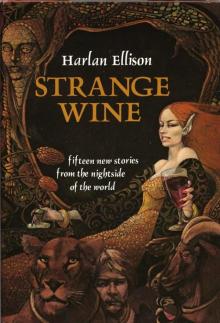 Strange Wine
Strange Wine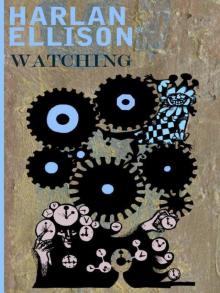 Harlan Ellison's Watching
Harlan Ellison's Watching Over the Edge/An Edge in My Voice
Over the Edge/An Edge in My Voice Troublemakers: Stories by Harlan Ellison
Troublemakers: Stories by Harlan Ellison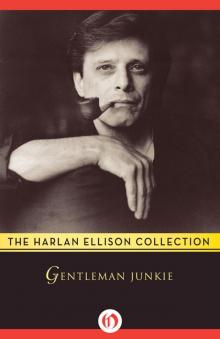 Gentleman Junkie and Other Stories of the Hung-Up Generation
Gentleman Junkie and Other Stories of the Hung-Up Generation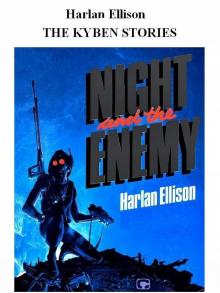 The Kyben Stories
The Kyben Stories From the Land of Fear
From the Land of Fear The Top of the Volcano: The Award-Winning Stories of Harlan Ellison
The Top of the Volcano: The Award-Winning Stories of Harlan Ellison Sleepless Nights in the Procrustean Bed
Sleepless Nights in the Procrustean Bed Ellison Wonderland
Ellison Wonderland Children of the Streets
Children of the Streets Can & Can'tankerous
Can & Can'tankerous Love Ain't Nothing but Sex Misspelled
Love Ain't Nothing but Sex Misspelled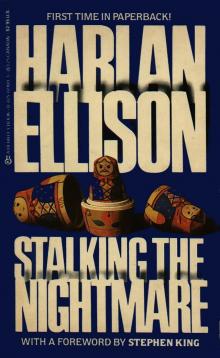 Stalking the Nightmare
Stalking the Nightmare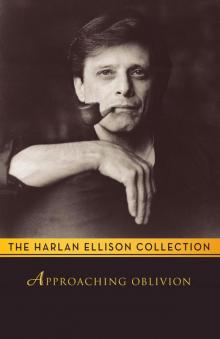 Approaching Oblivion
Approaching Oblivion Deathbird Stories
Deathbird Stories Partners in Wonder
Partners in Wonder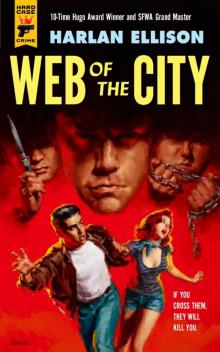 Web of the City
Web of the City Spider Kiss
Spider Kiss A Boy and His Dog
A Boy and His Dog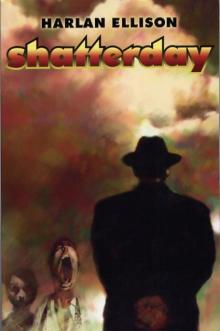 Shatterday
Shatterday Slippage: Previously Uncollected, Precariously Poised Stories
Slippage: Previously Uncollected, Precariously Poised Stories Repent, Harlequin! Said the Ticktockman
Repent, Harlequin! Said the Ticktockman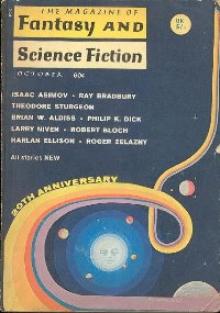 Come to Me Not in Winter's White
Come to Me Not in Winter's White The Song the Zombie Sang
The Song the Zombie Sang The Other Glass Teat
The Other Glass Teat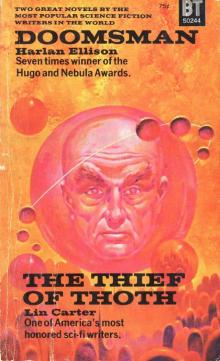 Doomsman - the Theif of Thoth
Doomsman - the Theif of Thoth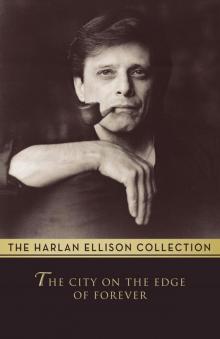 The City on the Edge of Forever
The City on the Edge of Forever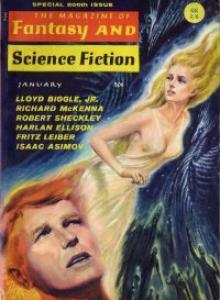 I See a Man Sitting on a Chair, and the Chair Is Biting His Leg
I See a Man Sitting on a Chair, and the Chair Is Biting His Leg The Harlan Ellison Hornbook
The Harlan Ellison Hornbook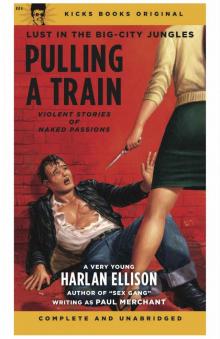 Pulling A Train
Pulling A Train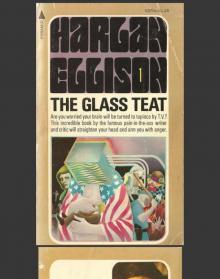 The Glass Teat - essays of opinion on the subject of television
The Glass Teat - essays of opinion on the subject of television An Edge in My Voice
An Edge in My Voice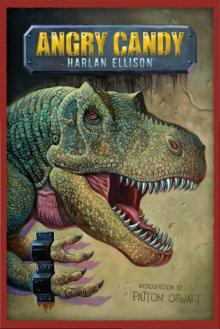 Angry Candy
Angry Candy Troublemakers
Troublemakers The Top of the Volcano
The Top of the Volcano Over the Edge
Over the Edge Survivor #1
Survivor #1 Slippage
Slippage